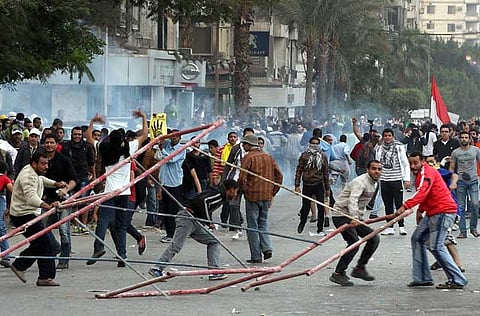Adly Mansour approves Egypt protest bill
Rights advocates slam law as stifling freedom of expression

Cairo: Egypt’s caretaker President Adly Mansour on Sunday signed into a law a draft bill regulating street demonstrations, a move slammed by rights groups as aimed at muzzling freedom of expression.
The draft law triggered a massive controversy among rights advocates when the military-installed government first unveiled it last month. The controversy prompted the government to introduce changes to the draft before referring it to Mansour, who temporarily holds the legislative power.
The government says the law is designed to prevent violent protests. However, rights groups are concerned that the law will be manipulated to oppress the opposition and crackdown on public gatherings.
Though the final version of the law was not immediately available, the opposition claims it continues to give police the right to use force in breaking up peaceful protests.
“The final draft of the law includes cosmetic amendments, which do not touch the core of the bill,” 11 rights organisations said. “It has ignored most recommendations made by political and civil society groups,” they added in a statement on Sunday.
Opponents also say the measure gives security agencies the right to block or relocate demonstrations and bans sit-ins. They add that the version endorsed by Mansour makes unlicensed rallies and protests punishable by a maximum fine of 30,000 Egyptian pounds (Dh16,666) compared to 10,000 pounds in the initial draft.
“This law will have a long-term impact on freedoms and rights of individuals in expressing their views,” said the rights groups, which includes the leading Cairo Centre for Human Rights Studies.
Backers of the toppled Islamist president Mohammad Mursi, mainly his Muslim Brotherhood group, have been staging street protests since the army deposed him in July. The Brotherhood has condemned Mursi’s overthrow as a coup and vowed to persist in protesting until he is reinstated. The army said it toppled Mursi, Egypt’s first democratically elected president, in response to a massive public demand.
More than 1,000 people have been killed in Egypt since Mursi’s removal in clashes involving his loyalists, opponents and security forces.
Thousands of Islamists have since been rounded up in a security clampdown in what the Egyptian authorities say is part of a campaign to stop terrorism, purportedly sponsored by the Islamist-led opposition.
The Brotherhood has repeatedly said it does not recognise the military-installed government and its measures.



